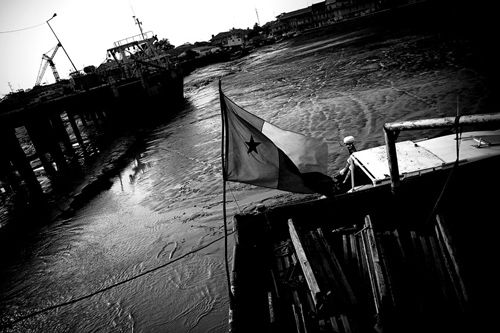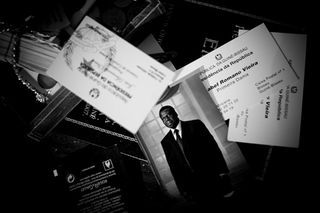Marco Vernaschi, for the Pulitzer Center
(Editor's note: This is the seventh of eight dispatches, recounting events surrounding the double assassinations of Guinea Bissau's president and army chief of staff last March and the country's emergence as a 'narco state.')
Several years ago, two long-friends met in Guinea Conakry to talk about some business opportunities. They were Lasana Conte and Joao Vieira, the presidents of Guinea Conakry and Guinea Bissau. It was 2006 and cocaine trafficking in West Africa was at a development stage.
President Lasana Conte proposed that his counterpart Nino Vieira come on board, and then easily convinced him to allow Latin American traffickers to use Guinea Bissau as point of transit for their business. The profits would be huge, the risks minimal.
In late December 2008, Conte died, after almost forty years of dictatorship. A few hours after his death, a bunch of soldiers seized power in a coup d'etat. According to this new, untried military junta that has ruled Conakry since the coup, the overall goal is to clean up the country from corruption and extirpate cocaine trafficking — and to do so before the next scheduled elections, in 2010.
On February 26th, three days before Viera was killed, Lasana Conte's oldest son Ousmane was arrested by the military on drug charges. He confessed on national television his involvement in drug trafficking, admitting his ties with some Colombian partners.
Ousmane Conte's trial was broadcast on TV because the junta is trying to convince the Guinean people that they're doing something necessary for their country, something good. It is a sort of propaganda. But according to some analysts at the UN Office of Drug Control, this is really a strategy to put the South American traffickers out of the game — to open a new era of African drug trafficking organized by Nigerians and Guineans, in cooperation with Guinea Bissau and Conakry armies.
The vacuum left by the double assassination of Vieira and Tagme and the situation in Conakry opens a new scenario in West Africa. The big plan is to transform the whole region into a sort of traffickers' paradise, a dangerous plan that may seriously destabilize West Africa, leading to new conflicts in a region that is trying to heal from bloody civil wars from the past decade in Sierra Leone, Liberia and Ivory Coast.



